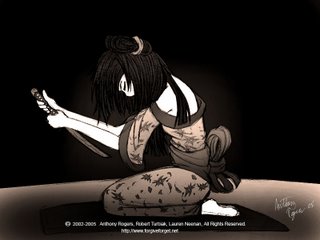Three unusual Japanese words I know

NYOTAIMORI
Nyotaimori is the much fabled "naked sushi" of Japanese origin. It's extremely difficult to find sushi restaurants that serve this openly. The reason for the difficultly in finding places that serve it is how the sushi is served, namely that it's on a naked body. This is normally a reasonably young and attractive woman and it has many feminists angry (perhaps rightly so if they don't see any value in a cultures traditions or art). There have been protests. Many in fact. The rough translation of the word Nyotaimori is "Adorned body of a woman." This type of art (yes, it's an art) is well accepted in Japan. Tokyo is world famous for this type of dinner theatre and art practice.

HIKIKOMORI
Hikikomori (pulling away, being confined, i.e., "acute social withdrawal") is a Japanese term to refer to the phenomenon of reclusive adolescents and young adults who have chosen to withdraw from social life, often seeking extreme degrees of isolation and confinement due to various personal and social factors in their lives. The term "hikikomori" refers to both the sociological phenomenon in general as well as to individuals belonging to this societal group.
The Japanese Ministry of Health defines hikikomori as individuals who refuse to leave their parents' house, and isolate themselves away from society and family in a single room for a period exceeding six months. While the distinctiveness of the phenomenon is varying depending on the individual, some of such youths remain in isolation for a span of years, or in rare cases, decades. Many hikikomori may start out as school refusals, or Tōkōkyohi in Japanese.
According to estimates by psychologist Tamaki Saito, who first coined the phrase, there may be a million hikikomori in Japan, twenty percent of all male adolescents, or one percent of the total Japanese population. Surveys done by the Japanese Ministry of Health as well as research done by health care experts suggest a more conservative estimate of 50,000 in Japan today. As reclusive youth by their very nature are difficult to poll, the true number of hikikomori most likely falls somewhere between the two estimates.
Though acute social withdrawal in Japan appears to affect both genders equally, due to differing societal expectations for maturing boys and girls, the most widely reported cases of hikikomori are from Japanese families with male children who seek outside intervention when their son, usually the eldest, refuses to leave the family home.

SEPPUKU
Seppuku ("stomach-cutting" or "belly slicing") is a form of Japanese ritual suicide by disembowelment. Seppuku is also known in English as hara-kiri and is written with the same kanji as seppuku but in reverse order with an okurigana. In Japanese, 'hara-kiri' is not in common usage, the term being regarded as gross and vulgar.
Japanese has a large number of different words related to death. Not all of these are still commonly used in Japan.
jisatsu for suicide
Seppuku and hara-kiri for ritual suicide
inseki jisatsu, suicide due to feeling guilty - still common in Japan
junshi, following one's Lord into death
jumonji giri, a version of seppuku with a second and more painful vertical cut across the belly
shinju for double suicide, and also more recently for murder suicides
joshi for a double suicide of lovers - this is still common in Japan
oyako shinju for a double suicide of parent and child
boshi shinju for a double suicide of mother and child
fushi shinju for a double suicide of father and child
ikka shinju for a family suicide
muri shinju for murder suicide
goi shinju for voluntary suicide (as opposed to murder suicide)
funshi for suicide to express indignation
tonshi for unexpected, sudden death
The following terms are archaic expressions from the Hagakure, a practical and spiritual guide for a warrior, written between in 1709:
oibara, to follow one's Lord into death by seppuku
maebara, to precede one's Lord into death by seppuku
sakibara, to follow one's Lord into death by seppuku
kobara, suicide to protect one's children
rokubara, suicide to protect one's family

3 Comments:
The Japs are just freaky .
I don't care if anyone disagrees ...
Maxxed Out: See my post on judging people based on their porn. I kind of agree with you.
Sushi should be served like this :)
Post a Comment
<< Home